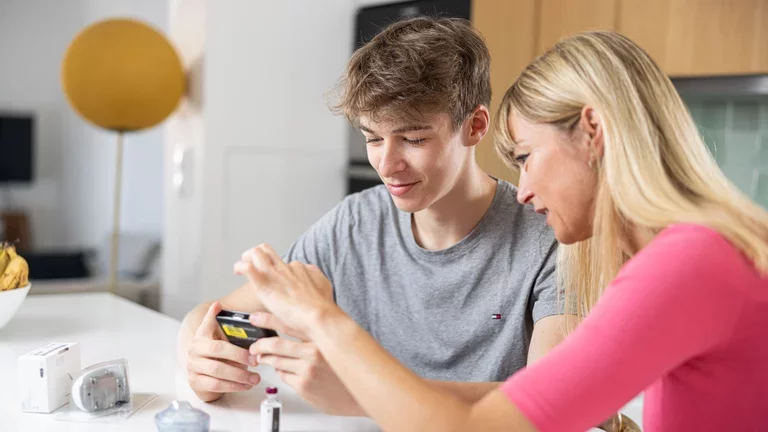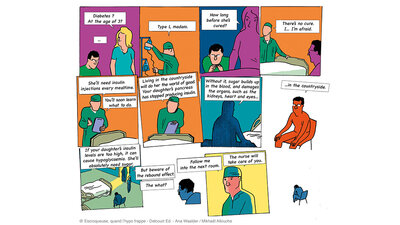Diabetes and technological innovation
What is the role of human support?
Published on June 27, 2024
5 minutes

A clinical study4 to evaluate support at home
Hybrid closed-loop insulin (HCL) therapy represents a major turning point in the management of people with type 1 diabetes (T1D), helping them to control their blood sugar levels4. Like all new technologies, it requires a specific learning curve for patients and their families. In France, the technical education of patients and the support of Hybrid Closed Loop (HCL) users are provided by expert nurses from Home Healthcare providers from treatment initiation to regular follow-ups along the patients’ journey. A multicentre, longitudinal, non-comparative, interventional study was designed to measure the satisfaction of T1D patients with the services provided by Home Healthcare providers during and after installation of an HCL system under real-word conditions. A total of 35 T1D participants with a prescription for a HCL system were studied during the three months following the introduction of the HCL system in two French hospitals. Questionnaires were completed by the participants in the clinical trial.
High satisfaction with human support
Participants rated the care they received either ‘good’ or ‘excellent’, with a CSQ-8 score of 28.9/32 at 1 month and 29.0/32 at 3 months5. Half of participants (45.7%) required additional unplanned contacts, with the majority being at the patient’s request. Reasons for these unplanned interactions were additional training needs, device-related incidents, sensor installation support, support for data upload, replenishment needs, management of alarms, motivational support, or need of reassurance. The study suggests the value of a personalized approach to healthcare services to meet the specific needs of each person with diabetes.
The role of the homecare providers in diabetes care
The Home Healthcare providers assist all types of people (adults, adolescents, children, pregnant women and the elderly) in managing their diabetes, specifically when they use insulin pumps or hybrid-closed loop. Their role is to give them the keys to managing their chronic disease as effectively as possible, i.e., controlling their blood sugar levels while reducing their mental workload to improve their quality of life. To this end, the HHC provider helps patients to familiarize themselves with medical devices, in particular the insulin pump and the CGM, by training them in their handling and maintenance (changing consumables such as the catheter and reservoir) and making them aware of the right reflexes to adopt in the event of problems. The Home Healthcare provider is also called upon to advise the patient in special situations (going on vacation, practicing a sport, etc.). The frequency of interventions is adapted to each person's individual situation:
- A young woman planning to become pregnant will be supported from the preconceptional period until several weeks after the birth.
- For an elderly person, the degree of autonomy, cognitive capacities and their evolution over time will be taken into account to define adapted and progressive objectives. Depending on the case, it may be necessary to provide technical training in pump use to a relative and/or a private nurse.
On the basis of these regular contacts with the patient, the HHC provider communicates information on the treatment experience and monitoring data to the healthcare team (diabetologist, nutritionist, general practitioner), with a view to adapting the treatment if necessary.
The support by Air Liquide Healthcare
With the aim of making life easier for people living with diabetes, Air Liquide Healthcare has designed a program that helps patients to define their expectations and objectives, and then supports them so that they can live as fully as possible.
This program is built around :
- 1 key idea: making cutting-edge technologies available with the support of Air Liquide Healthcare’s experts.
- 4 pillars: tailored treatment initiation, support anywhere, anytime, close collaboration with the healthcare team, priority given to health outcomes.
Through this program, we aim at improving the clinical indicators and reported outcomes (PROMs) that really matter to people living with diabetes.
References
1. Erin Digitale Scopeblog Stanford. [2017-11-29]. New research keeps diabetics safer during sleep
2. HbA1c is a measurement of average blood glucose levels over a long period (2-3 months). It enables the doctor to assess the effectiveness of treatment and predict the risk of long-term complications. Nathan DM, Turgeon H, Regan S. Relationship between glycated haemoglobin levels and mean glucose levels over time. Diabetologia. 2007 Nov;50(11):2239-44. doi: 10.1007/s00125-007-0803-0. Epub 2007 Sep 13. PMID: 17851648; PMCID: PMC8752566.
3. Renard E, Ikegami H, Daher Vianna AG, et al. The SAGE study: Global observational analysis of glycaemic control, hypoglycaemia and diabetes management in T1DM. Diabetes Metab Res Rev. 2021;37(7). doi:10.1002/dmrr.3430
4. Air Liquide Santé International. Evaluation of satisfaction regarding home healthcare provider (HHP) management of type 1 diabetic patients using a closed-loop automatic insulin delivery system (SATURN). NCT04635280.
5. The CSQ-8 questionnaire consists of eight questions, each with four possible answers. The questions assess service quality, whether the service meets participants' expectations, whether needs are met and problems solved. Participants rate their overall satisfaction and indicate whether they would recommend the service to a friend or use the same service again. The maximum total score for the CSQ-8 is 32, with higher scores indicating greater customer satisfaction.


